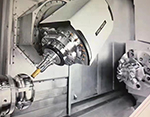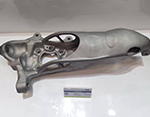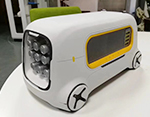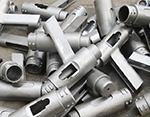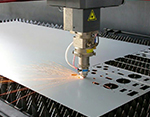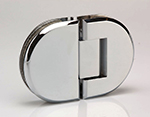Kesu's service advantages
Quality and reliability
We have highly trained engineers, machinists and quality control specialists who can complete your product in one go. Our team of experts follow industry standards and use best-in-class software, state-of-the-art CNC technology and quality control tools to manufacture our customers' parts.
Wide range of material options
We offer a wide selection of materials including metal parts (e.g. aluminium, steel, stainless steel, brass, copper), plastic parts (e.g. POM, PTFE, PC, PEEK, PET) and special alloys (e.g. ferrous alloys, Yin steel, Inconel, titanium, Mocu).
World-class machine shop
We adhere to a number of key industrial, quality and environmental standards. For example, our machine shop is certified to the ISO 9001 quality management system.
Cost-effective manufacturing services
At Kesu, we adhere to strict Design for Manufacture (DFM) standardsㅡ, which means we design parts and optimise designs to simplify manufacturing. This reduces our start-up, material and functional costs, providing you with a cost-effective manufacturing service.
Fast manufacturing and delivery
Not only do we get your product right, but we are located in the Greater Bay Area in southern China. Our proximity to major shipping ports allows us to get your product to you quickly.
Custom CNC machining
We offer a bespoke CNC machining service for customers who want to replace obsolete parts, use hard to machine materials or manufacture parts with special requirements.
We help you to cope with the complexity of CNC machining in China. Our team of highly skilled engineers.
Understand your end use (prototype, marketable, low to high volume) and help determine the right manufacturing solution
Work with you to find the right Chinese supplier for your unique needs
Manage all communication with overseas suppliers so you don't have to We have team members in China to help manage your project
Upload your CAD files for immediate quotation and manufacturability design feedback We want to win your business. If you get a lower quote for CNC machining, send it to us and we'll do our best to beat it.
How CNC machining works: an overview
How does CNC machining work?
CNC machining is a subtractive manufacturing process that uses computerised controls and machine tools to remove some of the stock material until the required bespoke part is made from the workpiece.
The machining process begins with the creation of a CAD (Computer Aided Design) model of the required part, which is then loaded into CAM (Computer Aided Manufacturing) software and converted into a set of computer instructions.
This set of instructions (or G-code) allows the machine to perform different cutting operations at high speeds (thousands of RPM) until the required custom part is produced.
How does CNC machining compare to 3D printing?
Both CNC machining and 3D printing rely on CAD files and computer input to transform the starting material into the required customised part. However, unlike the subtractive CNC machining process, 3D printing is an additive machining process. It revolves around adding material in layers to build the required custom part.
CNC machining offers a wide choice of materials, whereas 3D printing is only available for plastics, polymers and some powdered metals. In addition, CNC machined parts are often stronger than 3D printed parts; therefore, CNC machining is ideal for prototyping and production of functional parts.
What are the different types of CNC machining?
There are many different types of CNC machines, each with its own unique features.
CNC lathes and milling machines have built-in tools for cutting and drilling workpieces through to the manufacture of customised CNC parts. They are available in 3-, 4- and 5-axis configurations, depending on the complexity of the part.
The CNC milling process involves holding the part in place while the cutting tool rotates around it, whereas in CNC turning the part rotates around the fixed cutting tool to form the desired shape.
Unlike CNC milling and turning machines, which rely on cutting tools, CNC electric discharge machining machines (EDM) use electric sparks to machine the material into the desired shape.
CNC machining services materials and surface treatment
If you need to manufacture parts using CNC machining, it is important to know the types of finishes and materials that can be applied to CNC machined parts. Thanks to our surface finishing partners, we can also apply all types of finishing to CNC prototype and production parts. Need a customised CNC part with a high-quality appearance? We are here to help.
Control materials
Plastics: HDPE, PS, PAGF30, POM, DHPE, ABS, PP, PPS, (acrylic), PCGF30, Teflon, PC, ABS+PC, PEEK, PMMA.
Metals: steel, aluminium, stainless steel (17-4, Inconel 625 and 718), titanium, zinc, magnesium, bronze, brass, copper.
These are rated as common materials for CNC production parts and prototyping.
Numerically controlled machining
As-Machined: the most cost-efficient and popular way of operating components in-house. Uniform and fine toolpaths are also good, for aspect parts.
Sandblasted: parts are left with a matt appearance. a range of 320 to 120 beads allows us to apply different roughnesses to the surface.
Anodising: Type II has a wear-resistant surface. Parts can be anodised in a variety of colours - black, red, clear and blue are the most common. It is usually associated with the low silicon element series of aluminium.
Type III is thicker and produces a wear resistant layer in addition to the corrosion resistance of Type II.
Powder coating: This is a process whereby a powder coating is sprayed onto a part that is then prepared in an oven. This forms a strong, hard-wearing and consumption-safe layer that is more robust than standard painting methods. A wide range of colours can be used to give a perfectly tasteful finish.
We manufacture equipment for machined parts.
We operate all the necessary milling equipment with high precision, so we produce high-quality metal and plastic parts. There is a strict follow-up of machine tolerances and we make adjustments when necessary. Two highly skilled programmers create CAM programs for the numerous machined parts on a daily basis. In addition, a quality engineer follows the first samples off the machine and carries out inspections and adjustments on site.
We have a number of 3- and 4-axis CNC milling centres.
5-axis CNC machining centres.
Milling centres for large parts up to 4 metres long.
CNC lathes
Conventional turning and milling machines.
Drilling and deburring of holes.
Tapping of threaded holes.
Reaming of holes with narrow tolerances.


